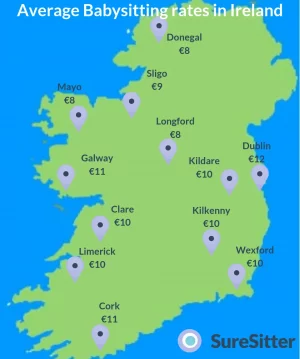A Guide to Childcare Costs in Ireland in 2023
Does it sometimes feel like you’re shouldering the burden of two mortgages? Unfortunately, if you’re a parent in Ireland, this might be a familiar feeling. Childcare costs have become a thorn in the side for families, with their significant impact on household budgets often influencing the tough decision of whether or not to return to work. This growing concern has led to very understandable frustration for families and to mounting pressure on the Irish Government to up their game in making early years childcare services both more accessible and affordable.
In this guide, we explore the childcare cost landscape in Ireland and spotlight the various childcare options for families. But before we dive in, let’s take a step back and take a look at recent trends in childcare costs and what the Government is doing to reduce this burden on families.
Recent Trends in Childcare Costs
According to the 2022 Annual Early Years Sector Profile Report by Pobal, a government-supported agency championing social inclusion and community development, childcare costs in 2020/2021 were a significant financial commitment for families. Parents were paying an average monthly fee of almost €800 per child with the average weekly fee for full-day childcare of €186.84. While part-time and sessional care were costing €110.92 and €74.20 respectively.
Interestingly, the report also highlighted how the location and the type of service significantly influenced these costs. For example, urban and affluent areas typically had higher fees compared to rural or less advantaged regions – with full-day care in affluent areas being 27% more expensive than in disadvantaged ones. Additionally, the age of the child was a key factor in the cost, with care for infants up to a year old being the most expensive.
Furthermore, the report found that a total of 104,612 children benefited from the Early Childhood Care and Education Programme (ECCE) programme in 2020/21. This programme is a universal two-year pre-school programme available to all children within the eligible age range and provides childcare for three hours per day, five days per week over 38 weeks per year.
The National Childcare Scheme, along with the Early Childhood Care and Education Programme (ECCE), are the key government supported programmes providing financial support to parents.
Budget 2023: Aid or Obstacle?
The landscape of childcare costs in Ireland is undergoing some changes, thanks to measures introduced in Budget 2023. Most notably, an additional €121 million was allocated to fund a reduction of up to 25% in the weekly fee for those availing of the National Childcare Scheme, with this measure anticipated to save parents/guardians up to €175 a month, or €2,106 a year. Further to this, an additional €59 million was allocated to support the Core Funding model, which aims to provide extra hours and enhanced capacity in the sector.
While these measures are undeniably beneficial, it’s fair to say they fall short of the comprehensive reform needed to truly address the issues in childcare sector. Instead, they represent a commendable but incremental step forward.
Childcare Options in Ireland
Overall, there are several viable childcare options available to parents and guardians in Ireland. Choosing the right childcare option depends on a variety of factors, including your child’s needs, your family schedule, your budget, and personal preferences. It’s important to research each option, meet potential caregivers in person, and where applicable, check references to ensure the best fit for your family. Let’s take a look:
- Creche: A creche is a type of childcare facility that offers full-time, part-time, and sessional care for children from a few months old up to school-going age. They’re usually staffed by trained childcare professionals and offer a structured environment with a blend of play, education, and social interaction. They’re a popular choice for working parents due to their flexibility and reliability. However, costs can be high, and availability may vary depending on your location.
- Childminder: Childminders are self-employed individuals who look after children in their own home. They offer a homely and flexible environment, often providing care for children of different ages together. They can be a more affordable option than a creche, but it’s important to ensure they’re registered and have the appropriate training and safety measures in place.
- Au Pair: Au pairs are typically young people from abroad who live with a family and help with childcare and light housework in exchange for board, lodging, and a small wage. This can be a cost-effective solution, particularly for families with multiple children. It also introduces a cultural exchange element. However, they may not have professional childcare qualifications and are not meant to provide full-time childcare.
- Nanny: A nanny is a professional who provides childcare within the child’s own home. They can offer personalised care and flexibility and may also assist with household duties related to the child. Nannies are usually experienced and may have relevant childcare qualifications. However, they can be one of the more expensive childcare options.
- Babysitter: Babysitters provide temporary, often short-term, childcare and usually on an ad hoc basis. They can be a good option for occasional care, such as during evenings or weekends. The cost of a babysitter can vary, and while they may not have formal qualifications, they should have some experience with children.
Average Childcare Costs in Ireland in 2023
Despite the various childcare options available, one common thread uniting most parents is the substantial financial investment required to secure quality care for their children. It’s important to understand these costs so you can plan and budget effectively, but also to appreciate the broader economic and social implications of childcare in Ireland. From regional variations to the influence of age and type of care, we break down the major factors that shape these expenses.
Creche Costs in Ireland in 2023
For those opting for a creche, costs can vary widely depending on location. To provide a snapshot, we’ll refer to data from a NewsTalk survey conducted in 2022 (survey figures were calculated based on the average cost of full-time care for a two-month-old toddler in each county).
According to the 2022 survey, Dublin had the most expensive creche rates in the country, with parents paying an average of €1,276 per month, marking a 20% increase over the past four years. Following Dublin were counties Wicklow and Cork, where prices stood at €928 and €857 per month, respectively. However, it is important to note that these averages don’t accurately account for variability within each county, with rates fluctuating based on factors such as local demand, quality of facilities, and staff-to-child ratios.
Interestingly, the survey also revealed the disparity in childcare rates across Ireland with price increases reported for 10 of the 26 counties surveyed, while costs actually decreased in 16 counties. This highlights the dynamic nature of childcare costs, which are influenced by a variety of local and national factors, meaning not all families will experience the same financial burden when it comes to creche costs. What’s more, the survey identified Longford as the least expensive county, with an average cost of €613 per month. Monaghan, Leitrim, and Roscommon also offered lower costs, with parents spending less than €655 monthly on average.
Average Creche Costs in Ireland:
| County | Average Creche Costs |
| Dublin | €1276 |
| Wicklow | €928 |
| Cork | €857 |
| Kildare | €844 |
| Meath | €841 |
| Westmeath | €786 |
| Kerry | €781 |
| Offaly | €766 |
| Tipperary | €744 |
| Sligo | €733 |
| Cavan | €733 |
| Louth | €715 |
| Galway | €713 |
| Limerick | €707 |
| Waterford | €707 |
| Donegal | €700 |
| Laois | €693 |
| Wexford | €687 |
| Mayo | €683 |
| Kilkenny | €680 |
| Carlow | €660 |
| Clare | €653 |
| Roscommon | €652 |
| Leitrim | €627 |
| Monaghan | €620 |
| Longford | €613 |
As we await the release of the 2023 survey, these figures provide a useful baseline for understanding the landscape of creche costs in Ireland. However, given the ongoing changes in the sector, including new government subsidies and initiatives, it will be important to reassess these figures in the coming months.
Childminder Costs in Ireland in 2023
In 2023, the average cost for a childminder in Ireland is typically €5 per child per hour, between €15-25 per half day and between €30- 50 for a full day. According to Childminding Ireland, the most common definition of a half day is 4 hours with a full day being either 8, 9 or 10 hours. However, to caveat this, as childminders are self-employed, they set their own rates so this can vary and may depend on the area and what is included in the childminding fees.
Factors influencing the childminding rate include whether the childminder is providing all meals or taking children to and from school or activities, whether the childminder is caring for siblings (which could potentially lead to a sibling discount), and the hours required for childminding (e.g., full time, part time, or after school hours). Additionally, whether the childcare arrangement is for term time only or continues throughout the year can affect the cost.
As such, it is advisable for parents to consider these nuances when budgeting for childminding services in Ireland in 2023, ensuring a clear understanding of what’s included in the childminding fees, and adjusting expectations accordingly.
Au Pair Costs in Ireland in 2023
Generally, you can expect to pay somewhere between €175 and €400 per week. However, the cost can fluctuate based on the au pair’s country of origin and qualifications.
Now, let’s talk about the minimum wage. If your au pair is 20 years or older, you’re looking at a minimum wage of €11.30 per hour. That’s on par with the National Minimum Wage. But if your au pair is younger than 20, the rates shift a bit: €10.17 per hour for those who are 19, €9.04 per hour for 18-year-olds, and €7.91 per hour for anyone under 18. Most au pairs are paid weekly, often in cash, but bank transfers are not uncommon. Remember that the overall cost isn’t just about hours worked; it also takes into account lodging and board expenses.
Minimum wage rates for Au Pairs in Ireland 2023
| Age | Minimum hourly rate € |
| Minimum wage (Aged 20 or over) | 11.30 |
| Aged 19 | 10.17 |
| Aged 18 | 9.04 |
| Aged under 18 | 7.91 |
Expect your au pair to work between 25 to 35 hours per week, but they should not exceed an average of 48 hours per week over a four-month period.
Additional responsibilities and the cost of living in your specific location within Ireland can significantly influence the final amount. So, it’s always a good idea to factor these variables into your budget when considering an au pair.
Be sure to check out What is the cost of an Au Pair in Ireland? for more information.
Nanny Costs in Ireland in 2023
When it comes to hiring a nanny in Ireland, a range of costs and obligations are involved. The hourly rate for a nanny varies significantly, from a minimum of €11.30, which aligns with the national minimum wage, up to €20. This disparity is typically influenced by several factors including experience, responsibilities, and working hours.
In the realm of childcare services, salaries are often negotiated in terms of net pay, which is the amount the nanny retains after tax deductions. However, for parents considering hiring a nanny, it is advisable to agree upon a gross pay rate. This mitigates the potential for unexpected additional tax costs that can arise from the nanny’s unique tax circumstances.
Lastly, it’s worth noting that if a nanny resides in the employer’s home, certain deductions can be applied, potentially influencing the overall cost of employing a nanny in Ireland.
For more on nanny costs, check out SureSitter’s article How much does a nanny cost in Ireland?
Babysitter Costs in Ireland in 2023
Generally, babysitting rates range from €6 to €15 per hour, contingent on aspects such as the babysitter’s age, experience, and the location where you’re based. Urban areas typically see a higher average rate.
Babysitter’s age and experience significantly affect the rates they can command. Younger babysitters tend to charge lower rates, while those with more experience can ask for higher fees. Additionally, there’s no legal minimum age for babysitting in Ireland, so the rates for babysitters under the age of 18 are usually agreed upon between the parents and the sitter. As a guideline, an employee under 18 is entitled to €7.91 per hour.
Another aspect that influences babysitter costs is the duration and nature of the babysitting engagement. Babysitting jobs in Ireland typically last between 4 to 6 hours. SureSitter previously carried out research to see how babysitting rates varied across the country. As expected, rates were higher in urban areas. The results of this research are shown below.
Average Babysitting Rates in Ireland by County
| County | Average Babysitting Rate |
| Dublin | €12 |
| Cork | €11 |
| Galway | €11 |
| Clare | €10 |
| Kildare | €10 |
| Kilkenny | €10 |
| Limerick | €10 |
| Wexford | €10 |
| Sligo | €9 |
| Donegal | €8 |
| Longford | €8 |
| Mayo | €8 |
For more information, check out SureSitter’s article How much should I pay my babysitter?
All in all, it’s clear that the cost of childcare in Ireland in 2023 varies significantly based on the type of childcare and the location. As these costs continue to rise, the Irish government’s commitment to reducing childcare costs through subsidies and increased funding will be vital for many families.
About SureSitter
SureSitter was founded by parents, for parents, to help make it easy for you to find childcare that others in your community know, trust and use.
If you need a nanny, childminder, au pair or babysitter we provide you with the tools to empower you to find the care you need.
Our service is here to help you to find the best person for your family. Sign up today.


![How much does a nanny cost in Ireland? [Updated 2023]](https://blog.suresitter.com/wp-content/uploads/2022/10/Nanny-and-children-playing-300x200.png)


